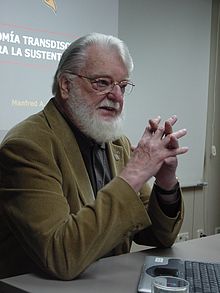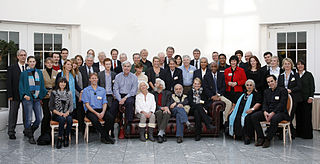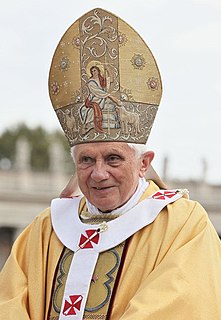
Pope Benedict XVI, served as head of the Catholic Church and sovereign of the Vatican City State from 2005 until his resignation in 2013. Benedict's election as pope occurred in the 2005 papal conclave that followed the death of Pope John Paul II. Benedict chose to be known by the title "Pope Emeritus" upon his resignation.
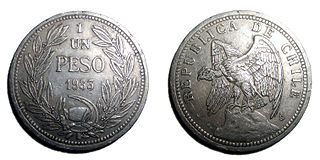
The Chicago Boys were a group of Chilean economists prominent around the 1970s and 1980s, the majority of whom trained at the Department of Economics of the University of Chicago under Milton Friedman and Arnold Harberger, or at its affiliate in the economics department at the Pontifical Catholic University of Chile. Upon their return to Latin America they adopted positions in numerous South American governments including the Military dictatorship of Chile (1973–90). As economic advisors, many of them reached high positions within those. The Heritage Foundation credits them with transforming Chile into Latin America's best performing economy and one of the world's most business-friendly jurisdictions. However, critics point to drastic increases in unemployment that can be attributed to policies implemented on their advice to fight inflation. Some have argued that these policies were deliberately intended to serve the interests of American corporations at the expense of Latin American populations. Peter Kornbluh states that in the case of Chile, American attempts to destabilize the Chilean economy ceased once the Chicago Boys had gained political influence; this may have been the true underlying cause of the subsequent increase in economic growth.
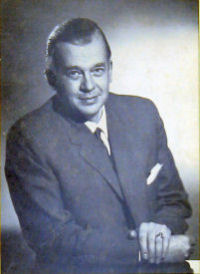
Ernst Friedrich Schumacher was a German statistician and economist who is best known for his proposals for human-scale, decentralised and appropriate technologies. He served as Chief Economic Advisor to the British National Coal Board for two decades, and founded the Intermediate Technology Development Group in 1966.

Small Is Beautiful: A Study of Economics As If People Mattered is a collection of essays by German born British economist E. F. Schumacher. The phrase "Small Is Beautiful" came from a phrase by his teacher Leopold Kohr. It is often used to champion small, appropriate technologies that are believed to empower people more, in contrast with phrases such as "bigger is better".
Leopold Kohr was an economist, jurist and political scientist known both for his opposition to the "cult of bigness" in social organization and as one of those who inspired the small is beautiful movement. For almost twenty years, he was Professor of Economics and Public Administration at the University of Puerto Rico. He described himself as a "philosophical anarchist." His most influential work was The Breakdown of Nations.
In international economics, overdevelopment refers to a way of seeing global inequality that focuses on the negative consequences of excessive consumption. It exists as the mutually constitutive counterpart to the more commonly known concept of 'underdevelopment'.

La Calera is a city and commune in the Quillota Province of central Chile's fifth region of Valparaíso.
The taxonomy of the fundamental human needs, and the ways in which these needs can be satisfied is developed by Manfred Max-Neef. This taxonomy is based on his work on Human Scale Development, and was published for the first time in 1986.

Shahdad is a city and capital of Shahdad District, in Kerman County, Kerman Province, Iran. At the 2006 census, its population was 4,097, in 1,010 families.
Gary Wynn Yohe is the Huffington Foundation Professor of Economics and Environmental Studies at Wesleyan University, Middletown, Connecticut. He holds a PhD from Yale University.

Hernán Alberto Büchi Buc is a Chilean economist who served as minister of finance of the Pinochet dictatorship. In 1989 he ran unsuccessfully for president with support of Chilean right-wing parties.
Human development is the science that seeks to understand how and why the people of all ages and circumstances change or remain the same over time. It involves studies of the human condition with its core being the capability approach. The inequality adjusted Human Development Index is used as a way of measuring actual progress in human development by the United Nations. It is an alternative approach to a single focus on economic growth, and focused more on social justice, as a way of understanding progress.
Human Ecology, Human Economy: Ideas for an Ecologically Sustainable Future is a 1997 book edited by Mark Diesendorf and Clive Hamilton. The authors' intent is to "develop some of the basic ideas, concepts and tools that are needed to create a set of preferred futures for the Earth". According to the editors, the book provides equal measures of human ecology and ecological economics, in order to assist the process of working towards a better future.
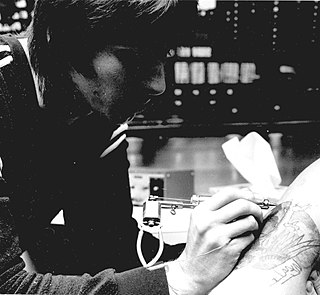
Manfred Kohrs is a German tattooist and conceptual artist, who has been tattooing since 1974. He was a student of Horst Streckenbach. Together they developed the barbell piercing in 1975. Kohrs invented a rotary tattoo machine with main part an electric motor and an ink reservoir. In 1977 Kohrs founded the first German Tattoo Artist Association. He gave up tattooing in 1990 and began studying economics.
Nader Abd-Elmaksoud Fergany is an Egyptian sociologist and economist. He is director of the Egyptian research center Al-Mishkat.
Rajni Kothari was an Indian political scientist, political theorist, academic and writer. He was the founder of Centre for the Study of Developing Societies (CSDS) in 1963, a social sciences and humanities research institute, based in Delhi and Lokayan, started in 1980 as a forum for interaction between activists and intellectuals. He was also associated with Indian Council of Social Science Research, International Foundation for Development Alternatives, and People's Union for Civil Liberties.

Imran Nazar Hosein is an Islamic scholar, author and philosopher specializing in Islamic eschatology, world politics, economics, and modern socio-economic/political issues. He is the author of Jerusalem in the Qur'an and other books.

(Elizabeth) Anne Cutler FRS is a Research Professor at the MARCS Institute for Brain, Behaviour and Development, Western Sydney University and Emeritus Director of the Max Planck Institute for Psycholinguistics in Nijmegen.
Local development is a relatively young theory in social sciences based on the identification and use of the resources and endogenous potentialities of a community, neighbourhood, city, municipality or equivalent.
Patrick Ricard is an American football fullback and nose tackle for the Baltimore Ravens of the National Football League (NFL). He played college football at Maine.



